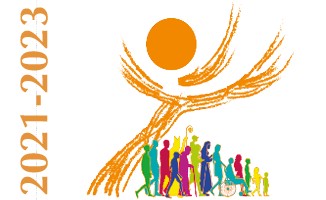Panamá, 12/09/2021, Sr. Rosemery Castañeda Montoya.- Synod on Synodality, new words that we were not used to hear, and yet they are the ones that are going to set the rhythm of our Church the next two years (2021- to October 2023-). It is an "Church event".

"For a Synodal Church: Communion, Participation, Mission". The whole Church is confronted with the weight of a culture impregnated with clericalism and forms of the exercise of authority in which various types of abuse (of power, economic, sexual) are inserted.
"A conversion of ecclesial action without the active participation of all the members of the People of God" is not possible.
Moreover, despite our infidelities, the Spirit continues to act in history and to show its life-giving power. It is a reason for great hope that not a few Churches have already begun to organize more or less structured meetings and processes of consultation with the People of God.
Synodality places us all in a horizontal dynamic, where the hierarchy passes to another level, in order to give way to an encounter with the people of God.
On October 17th, when the Metropolitan Archbishop, José Domingo Ulloa Mendieta, inaugurated the Synod in Panama, the Church on pilgrimage in our country committed itself with joy, faith and confidence to work to "listen" to the other, to the one who is within the Church and those outside it; those who are equal and those who are different; believers and non-believers. The beautiful Eucharist that opened the Synod in Panama was celebrated at Cristo Redentor Parish, located in San Miguelito. It was there, more than forty-five years ago, that the first Basic Ecclesial Communities were born and the resolutions of the Vatican Second Council in and the conclusions of the Medellin Document were put in place in Panama.
Methodology for the synodal process in our Archdiocese.
How is the "walking together" in synodality taking place in our Church today? What steps does the Spirit invite us to take in order to grow in our "walking together"? What aspects of synodal conversion does the Holy Spirit invite us to realize in our Archdiocesan Church? In the Church and in society are we on the same path side by side? In the Panamanian Church, who are our fellow travelers, considering also those outside the ecclesial perimeter?
1. Whom to consult?
According to the synodal proposal, the particular Church should ensure the greatest possible participation of the People of God, by the Archdiocesan pastoral structure who will allow us to carry out this experience, embracing all the pastoral realities, from the Episcopal Vicariates of the Zone, the Pastoral Delegations and the Archdiocesan Curia, to the parish realities, without forgetting the importance of establishing actions of listening and dialogue with those outside these groups.
From 18 October to December, in this first phase, called "listening, which is and will be the spiritual route in this synodal journey, we seek, as a pilgrim church, to take a genuine attitude of listening among the people and with the people of God. An evangelical listening that opens us to new horizons in order to act in the style of Jesus and to act with the example of Our Lady. To express what we want, what we dream of, what we hope for, to recognise the signs and to learn to listen to the Holy Spirit.
We have proposed days that favour "walking together", to carry out a Lectio Divina that will help us to listen more deeply to the voice of the Spirit for this pastoral process of conversion, to improve the quality of dialogue, to discern on other questions that touch on the interests of our
people, strengthen the conversion in attitudes and skills, and encourage a sense of connectedness among ourselves and with the people of the parishes.
- We have convoked together priests, religious sisters, permanent deacons and the churches that forms the ecumenical community.
- Delegates of the Word, CEB, catechists and animators from the missionary zones.
- Coordinators of the various apostolic movements and lay ministries.
- Couples, young people, children, educational establishments, hospitals and health centres.
- Elderly’s institutes centers, homes, children's centers, etc.
- Processes to form synodal groups by vicariates and parishes.
From December to March, we will be reaching out to other realities: the Synod insists on the importance of going to the peripheries, and going to those who are far away.
Therefore, we will include the following realities in our synodal consultation: parliamentarians, business people, "Conversemos de Ciudad” group, the LGTBI collective, Local Religious Freedom, street dwellers, women's groups in street people, a group of women in prostitution, displaced persons in intra-urban areas, nationals, migrants in Panama, many other social groups.
We trust that the laity people, the religious, the consecrated persons and the pastors of our Panamanian Church, we will live this synodal journey with enthusiasm, committing ourselves to its realization.
